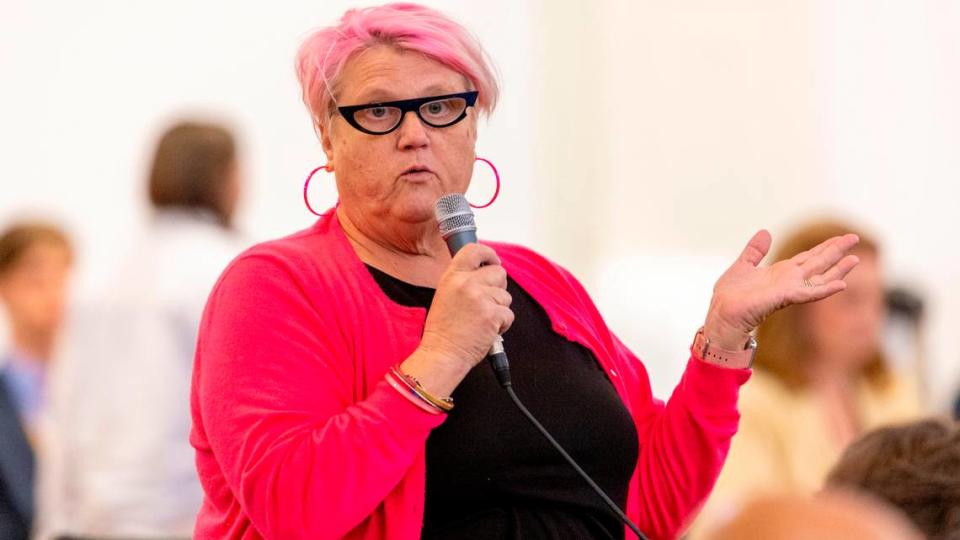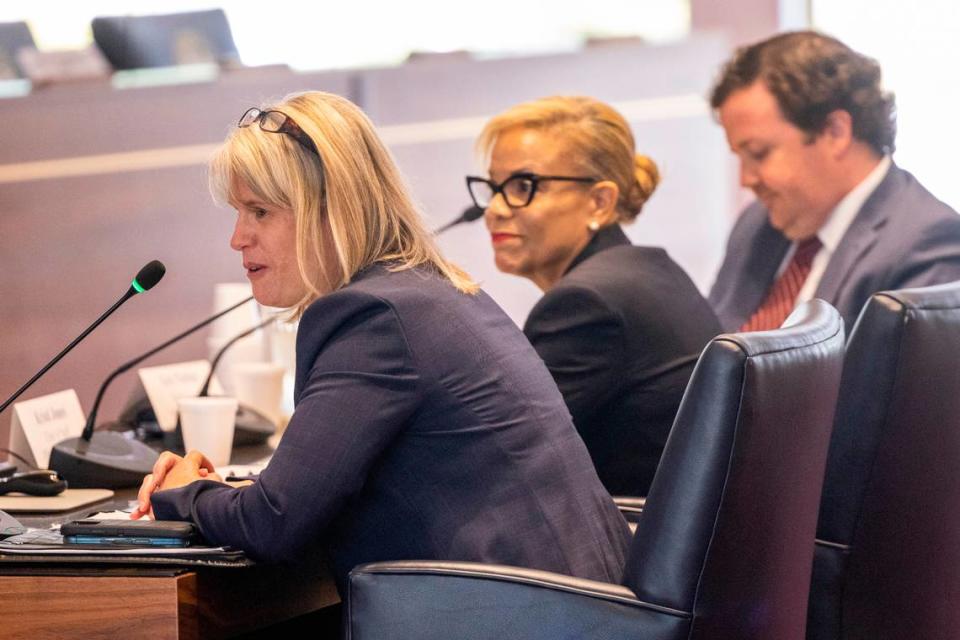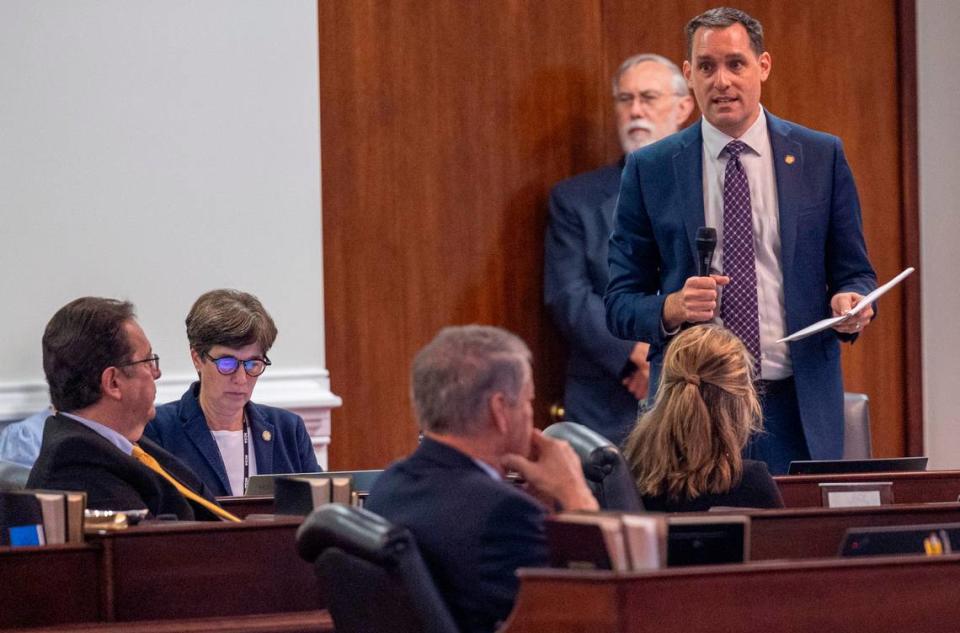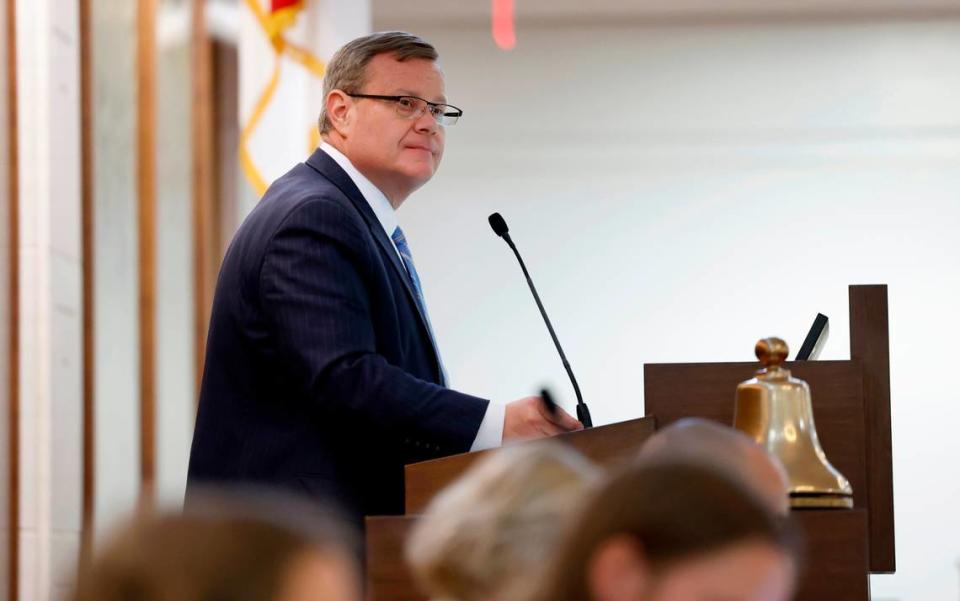Not just about money: New laws in state budget give more power to the General Assembly
- Oops!Something went wrong.Please try again later.
North Carolina is different from other states. It has beautiful scenery from the mountains to the coast. It has great barbecue, phenomenal college sports and a plethora of longleaf pine trees.
It also has a habit of passing a state budget that is about way more than spending taxpayer money. There’s a lot of policy in there, too, and this year much of it is about giving more power to the General Assembly.
The budget was written by the leaders of the legislature’s Republican supermajority, and became law in early October without the signature of Democratic Gov. Roy Cooper. If he had vetoed it, there were enough votes to overturn it.
Lawmakers gave their branch of government more power to choose judges and higher education leaders, to explain to the public what they’ll be voting on, and to keep their communications secret.
But possibly the most controversial change is an expansion of powers for a committee most people have never heard of. The Joint Legislative Commission on Governmental Operations, or Gov Ops, is a committee of lawmakers led by the majority party who have the power to hold oversight hearings on anything ranging from hurricane relief to the state’s high school athletic association.
Critics of lawmakers giving themselves more investigative powers described the policy change in language that invoked dictatorships, with Sen. Graig Meyer describing it as “dark government” and “Gov Ops Gestapo powers” and Rep. Allison Dahle as a “secret police.”
Republican House Speaker Tim Moore called the idea of secret police powers “just ridiculous.”
“I mean, there’s no basis,” Moore said. “There’s no arrest powers. I mean, there’s nothing like that.” He called it “creative, political hyperbole.”

What Gov Ops can do now
Gov Ops’ role, lined out in the new state law, is to “study the efficiency, economy, and effectiveness of any State agency, public authority, unit of local government, or non-State entity receiving public funds.” It also evaluates implementation of policy, as well as investigating possible “misfeasance, malfeasance, nonfeasance, mismanagement, waste, abuse, or illegal conduct” at state agencies, local government or non-state entities that receive public funds. The law also allows Gov Ops members and staff to have access to buildings as part of its investigations.
The penalties for not cooperating with an investigation include getting fired or facing criminal charges.
The commission’s hearings are public, but the investigations are now even more opaque. All the documents “obtained or produced by” Gov Ops staff are exempt from public records law. State employees and others are not supposed to talk about requests by Gov Ops staff.

“This is about the access of legislative staff to the public’s homes, businesses and records,” Meyer said on the Senate floor before the final budget vote.
Moore, a Kings Mountain Republican, told reporters on Oct. 5 that hearings on the state’s hurricane relief were a reason for the expansion.
“It goes back to the oversight role that we were looking at on the hurricane relief. Why years later, when hundreds of millions of dollars of taxpayer dollars have been spent, why some people are still living in temporary trailers, and all these kinds of things. Why homes haven’t been fixed, why infrastructure hasn’t been repaired, why those things haven’t been done.”
“And when our committee was bringing folks in to ask those questions, they were getting stonewalled and delayed and couldn’t get the information,” Moore said.
Sen. Phil Berger, an Eden Republican, said in September that said Gov Ops staff saw some “roadblocks,” when they were investigating issues related to hurricane repairs that fell under the Cooper administration.
Gov Ops House Majority Staff Director Joe Coletti told The N&O in an interview that some of the commission changes in the budget have been in the works since it was started.
He and others in Gov Ops work in the Legislative Office Building in space previously occupied by the nonpartisan Program Evaluation Division, which was eliminated in 2021 and replaced by Gov Ops.
Coletti said that the Program Evaluation Division already had the ability to make unannounced site visits, and the state auditor already has the ability to take a look at contracts and audit records of contractors.
“So we were going through those and saying, ‘What powers do folks already have, that we need to make sure that will transfer over to this group?” he said.
Those former Program Evaluation Division powers, however, did not include the ability to make criminal referrals and keep state employees and others from being able to talk about being the subject of an investigation.
The new state law says that a person who “conceals, falsifies, or refuses to provide to the Commission any document, information, or access to any building or facility” with the intent to interfere, mislead or impede an investigation is guilty of a Class 2 misdemeanor.
Asked about the “secret police” criticism, Coletti said any criminal charges are just referrals; there’s no Gov Ops law enforcement.

Coletti said the reasoning for the new confidentiality rule is to protect whistleblowers and to prevent someone from giving investigators the run-around.
He said the rule also keeps someone from facing “undue pressure” from other officials who learn the person is talking to Gov Ops.
Who’s in charge of Gov Ops?
While Gov Ops is an oversight group, there is no oversight of Gov Ops outside of the corner offices where Moore and Berger work. The two leaders co-chair the commission.
Ann Webb, the policy director of government watchdog group Common Cause North Carolina, said “an agency that is designed to protect the interests of the public spending, state funds should be operated in such a way that it reflects the public interest in its structure — not simply the interest of a couple of very powerful individuals.”

Berger argues that Democrats have staff on Gov Ops too, not just Republicans.
“It is something that is designed to assist the General Assembly, and all members of the General Assembly, in carrying out our constitutional obligations to oversee the money that’s being spent and the policies that are being carried out by the executive branch and by other branches,” Berger said.
Republicans have the most Gov Ops staffers, while Democrats have just a few. Moore and Berger, sometimes with recommendations from Republican staff, decide who will be the subject of investigations and hearings. Republicans say that’s simply because they hold the majority in the General Assembly.
A legislative staffer for Democrats told The N&O there isn’t much interaction between the partisan sides of Gov Ops. The staffer described the work as “a lot of side-by-side investigations with not much collaboration.” Coletti said there’s “a little bit” of joint work.
Coletti and others on the Republican staff report to the chiefs of staff for Moore and Berger, and Democratic staff members report to the chiefs of staff for Senate Minority Leader Dan Blue and House Minority Leader Robert Reives.
The minority party staffer said the “gag order” on people talking to Gov Ops could have a chilling effect on businesses that might want to work with North Carolina’s state government.
“This confidentiality provision would prevent not only, like, the public from knowing about these investigations, but also other staff and other members of the commission. Because essentially it’s putting a gag order on the agency employees that are being reached out to by Gov Ops,” the staffer said.
By not clearly laying out how a criminal referral is made, and by who, the change to Gov Ops powers fails to provide “guardrails” that would make the referral process legitimate, the staffer said.
Public records exemption
Another major policy change in the budget that’s now law pertains to records.
Obtaining public records from state lawmakers was already difficult. Lawmakers could claim so-called “legislative privilege” to deny records requests, though they did grant some of them.
The law now omits them entirely, allowing the lawmaker herself or himself to decide what’s a public record and whether or not to keep it. Gov Ops and redistricting records are now exempt, too, under state law.
“Democracy requires transparency,” Webb said.

More power to the NCGA overall
Webb, with Common Cause, said it’s “really important to look at the holistic picture. All the ways that the legislature has been grabbing power for itself.” She said Gov Ops is just the latest example.
Webb said that Common Cause is “always concerned with balance of power, and checks and balances disrupted, and that’s not only the balance of power among the three branches of government but also the ability of the people to oversee what their government is doing.”
There are several more policy changes that allow the legislature to wield more power:
▪ Power to write the official explanations of proposed amendments to the state constitution will be given to the person who runs the Legislative Building: Legislative Services Officer Paul Coble, who is a former Raleigh mayor and Wake County commissioner. Instead of the Constitutional Amendments Publication Commission in the Secretary of State’s office, it will be the legislative service officer who “shall prepare an explanation of the amendment, revision, or new Constitution in simple and commonly used language.” The LSO consults with the Secretary of State, who prints the amendment summary.
▪ The budget also removed the governor’s appointment power for the State Board of Community Colleges. Instead of 10 appointed by the governor, the General Assembly will now appoint those 10 in addition to eight positions they already controlled, The N&O previously reported.
▪ The legislature also gave itself more power in a different branch of government: the courts. The House speaker and Senate leader will get to pick 10 new special superior court judges. The General Assembly will also get to pick four judges on the Judicial Standards Commission, which hears complaints against judges, who were previously appointed by the State Bar Council.
”These changes are a dangerous consolidation of power within the North Carolina General Assembly,” Sen. Mujtaba Mohammed said in a video he posted on Facebook criticizing the judicial provisions. “We cannot allow North Carolina to become a place where the pillars of our state government crumble for the benefit of extreme partisan political gain.”
▪ Another policy change in the budget targeted the state’s insurance commissioner. Republican Insurance Commissioner Mike Causey is no longer also the fire marshal. Causey objected to the change, calling it “needless.” The fire marshal will be filled by a new person within the Department of Insurance.
“The lack of communication with the Department of Insurance and no input or discussion allowed on changes to the Office of the State Fire Marshal is very disturbing,” Causey said in a statement in late September.

Policy in budgets not common
The National Conference of State Legislatures told The N&O there are only a few states that include policy in their budgets, like Pennsylvania and Wisconsin, in addition to North Carolina.
Berger said policy provisions in the budget are things that have been discussed in committees or in bills that passed one chamber but not the other.
“I think it’s just a continuation of the practice has been in place in North Carolina for a pretty long period of time,” he said.

